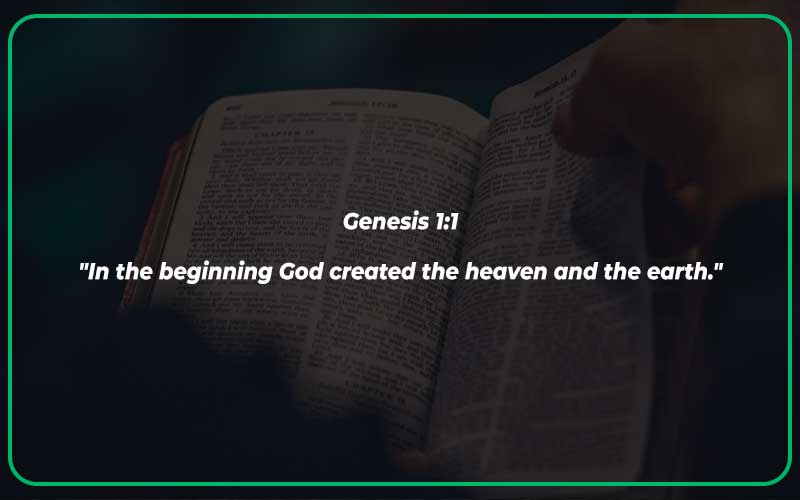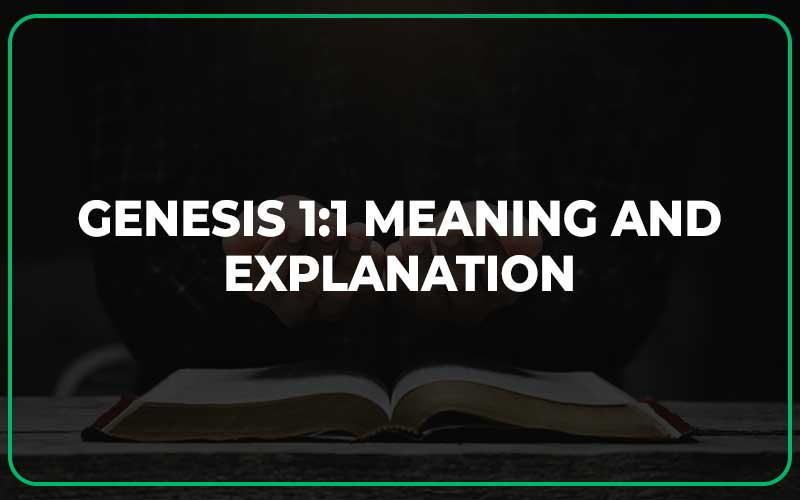Genesis 1:1
“In the beginning God created the heaven and the earth.”
Genesis 1:1 Meaning
Genesis 1:1 is the opening verse in the Bible. This verse is the starting point of the Bible and is an introduction to the account of creation. It signifies that God existed before anything else and initiated the creation of the universe, including the heavens (sky or space) and the earth.
Different religious interpretations exist regarding the specific details of how this creation occurred, but this verse is generally accepted as the foundational statement about the origin of the universe from a theological perspective. It establishes the belief that God is the ultimate creator and initiator of everything that exists.
Genesis 1:1 serves as a foundational statement, setting the theological framework for understanding the origin of the universe according to Judeo-Christian beliefs. It asserts the existence of God as the primary cause and initiator of creation, establishing the concept of divine sovereignty over the cosmos.
This verse, while brief, lays the groundwork for the entire Genesis creation narrative. It’s important to note that the language used in the ancient Hebrew text of Genesis implies God as the sole creator, distinct from and superior to all other beings or forces.
Throughout history, various interpretations and debates have arisen regarding the precise timeline, methods, and duration of creation described in Genesis. Some view these accounts as a literal description of how the universe came into being, while others interpret them more metaphorically or symbolically. These diverse interpretations have sparked discussions among theologians, scientists, and believers across different traditions.
Ultimately, Genesis 1:1 sets the tone for understanding the divine origin of existence, affirming the belief in a purposeful and intentional creation by a transcendent and all-powerful God.
Context of Genesis 1:1
Genesis 1:1 is the opening verse of the Bible and is the beginning of the creation narrative in the book of Genesis. To understand its context, it’s essential to look at the structure and purpose of the book as a whole:
- Book of Genesis: This book, which is the first in the Bible, is divided into two main parts. The first part (chapters 1-11) focuses on primeval history, dealing with the creation of the world, the early history of humanity, the origins of different nations, and the account of the great flood. The second part (chapters 12-50) centers on the patriarchs—Abraham, Isaac, Jacob, and Joseph.
- Creation Narrative: Genesis 1:1-2:3 presents the creation account, often divided into seven days or periods, where God brings the world and everything in it into existence. Each day represents a stage in the creation process, culminating in the seventh day when God rested.
- Theological and Literary Intent: The book of Genesis was written to convey theological truths and origins, offering explanations for the existence of the universe, humanity’s beginnings, and the relationship between God and humanity. It addresses fundamental questions about the nature of God, the purpose of creation, and humanity’s place in it.
The context of Genesis 1:1 within the larger framework of the book and its purpose emphasizes the following points:
- Introduction of God as Creator: The verse opens by establishing God’s role as the creator of the heavens and the earth. It asserts that everything has its origin in God’s creative act, laying the foundation for understanding the divine authority over creation.
- Emphasis on God’s Sovereignty: By introducing God as the initiator of creation, this verse emphasizes God’s supremacy and sovereignty over the universe. It sets the stage for the subsequent narrative by highlighting the intentional and purposeful nature of God’s creative work.
- Theological Significance: Genesis 1:1 serves as a theological statement affirming monotheism and the belief in a transcendent, omnipotent deity responsible for the existence of the cosmos.
Understanding Genesis 1:1 in its context within the larger narrative of creation helps frame its significance as the foundational statement that introduces the biblical account of origins and the role of God as the supreme creator.

Breaking Down the Key Parts of Genesis 1:1
“In the beginning”: This phrase denotes the starting point of all existence. It emphasizes that before anything else existed, there was a distinct moment when the act of creation began. It doesn’t define how long this “beginning” was but rather focuses on the initiation of time, space, and existence itself.
“God”: This single word encapsulates the God, a supreme, omnipotent, and transcendent being responsible for the creation of the universe. It asserts the monotheistic belief that the universe was not a random occurrence but was intentionally brought into existence by God.
“Created”: This word implies a deliberate and purposeful act of bringing something into existence that did not previously exist. It highlights God’s role as the ultimate creator, illustrating His power and authority over all things.
“The heavens and the earth”: This phrase encompasses the totality of creation. “Heavens” could refer to the celestial bodies, the sky, or the entirety of space. “Earth” signifies the physical world, including land, water, and all living things.
Understanding these key components helps in comprehending the depth and significance of Genesis 1:1 as the foundational statement that introduces the biblical account of creation, establishing God as the primary creator and initiator of the universe.
Also Read: Numbers 1:20-46 Meaning and Explanation
Bible Study on Genesis 1:1
Genesis 1:1 is the opening verse of the Bible, setting the stage for the creation narrative. Despite its brevity, this verse holds profound significance in understanding the origin of the universe and the foundational beliefs of the Christian faith.
Key Points
- Genesis 1:1 affirms the belief in a singular, supreme deity as the initiator and author of creation.
- The verse emphasizes God’s intentional and purposeful act in bringing the universe into being, showcasing His sovereignty over all things.
- It introduces the foundational truth of monotheism, asserting that all existence finds its origin in God.
Application
- Recognition of God’s Sovereignty: Reflect on the power and authority of God as the creator of the universe. Acknowledge His sovereignty over your life and the world.
- Gratitude for Creation: Develop a sense of awe and appreciation for the beauty and intricacy of the world around you. Take time to admire and be thankful for God’s creation.
- Understanding of Faith: Use Genesis 1:1 as a cornerstone in your faith. Let it strengthen your belief in God as the originator of all things, fostering trust and reliance on Him in your life.
Genesis 1:1 encapsulates the foundational truth of God as the creator and initiator of the universe.
It establishes the basis for understanding the Christian faith, emphasizing God’s sovereignty and intentional design in bringing forth all of creation.
This verse invites us to recognize God’s power, appreciate His creation, and build our faith upon the understanding of His divine authority.
Biblical Translations of Genesis 1:1
Genesis 1:1 (NIV)
“In the beginning God created the heavens and the earth.”
Genesis 1:1 (ERV)
“God created the sky and the earth. At first,”
Genesis 1:1 (NLT)
“In the beginning God created the heavens and the earth.”
Genesis 1:1 (NASB)
“In the beginning God created the heavens and the earth.”
Genesis 1:1 (RSV)
“In the beginning God created the heavens and the earth.”
Genesis 1:1 (NKJV)
“In the beginning God created the heavens and the earth.”
Final thoughts
Genesis 1:1 serves as a profound opening statement in the Bible, encapsulating the foundational belief in God as the supreme creator of the universe. This brief verse initiates the narrative of creation, emphasizing God’s intentional and purposeful act in bringing all things into existence.
It establishes the cornerstone of monotheism and invites us to acknowledge God’s sovereignty, appreciate His creation, and build our faith upon the understanding of His divine authority over all things.
Genesis 1:1 remains a timeless reminder of God’s power and the origin of all existence.

